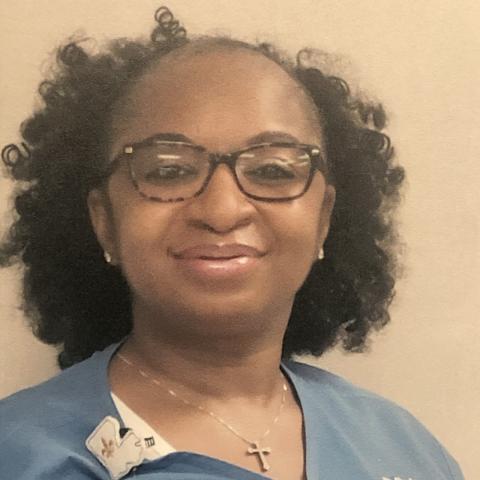Alexis Black was already pursuing her Master of Science in Nursing online through the University of Louisiana at Lafayette when she decided to apply for the Graduate Certificate in Cardiovascular Nursing.
Her coworkers told her she was crazy.
But when Black recognized a patient was having a heart attack and was able to respond to get the 51-year-old woman to a hospital before she sustained long-term heart damage, Black knew she’d made the right decision. 
“When you see the good outcome, and you know you played a role, and that person is spending more time or more Christmases or birthdays with their family, that's the rewarding part,” Black says. “I can say doing the cardio certificate definitely gave me insight.”
Completing the online cardiovascular program in August 2020 was only one stop along Black’s academic journey, which she says is far from over.
‘It’s my time’
Black says after earning her associate’s in 1994, her professional development sat on the back burner while she prioritized her family.
“I always wanted to at least obtain my four-year degree, but raising a family, helping with grandkids came first,” Black says. “I’m finally to a place where I feel I can work on my career and achieve some of the goals I want to.”
Black enrolled in the University of Louisiana at Lafayette’s online RN-to-BSN degree program to fulfill that goal in 2016. With one degree down, Black kept going, enrolling in the online Master of Science in Nursing and Graduate Certificate in Cardiovascular Nursing programs.
“I felt like, I'm accomplishing this goal, but that's not where I want to stop — I don't want that to be the end,” Black says.
Critical care insights
Black had nearly 20 years of experience in critical care — and two full-time jobs — when she returned to school.
She says even with her extensive experience, she didn’t understand all the complexities and co-morbidities of congestive heart failure. Gaining that insight has changed her practice and patient outcomes.
“Time is muscle,” when responding to a cardiac event, says Black. So being able to recognize a heart attack quickly — as Black did with her 51-year-old patient — is critical to life-saving care and treatment.
“When the cardiologist came in the next day, he said, ‘had anybody else been watching this monitor, I don’t think they would have realized how important it was,’” says Black.
In addition to understanding cardiovascular disease processes through the graduate certificate program, Black says pursuing her master’s in nursing changed her approach to patient care.
“I'm now looking at the whole patient,” Black says. “I'm more knowledgeable on how to treat the whole person rather than just one acute event.”
Careful planning
Investing in herself in order to invest in her patients required careful planning and a lot of understanding from those around her, Black says.
“To get through the program, you have to have supportive and understanding family and friends,” Black says. “You do sacrifice — I might miss dinner or some football games or these things.”
In addition to her professional motivations, Black was personally motivated after losing her father to a heart attack. Although she knew the graduate certificate would compound her workload, she embraced the opportunity.
To stay ahead, Black says she completed as much of her master’s coursework as possible before the cardiovascular program began in March. On her weekends off, she says, she split her days to focus on master’s coursework one day and cardiovascular coursework the other.
“It definitely requires a lot of very detailed scheduling to make sure all the pieces fall in place,” she says.
Upon completing her MSN in 2021, Black plans to specialize in cardiovascular care on her way to pursuing her Doctor of Nursing Practice.